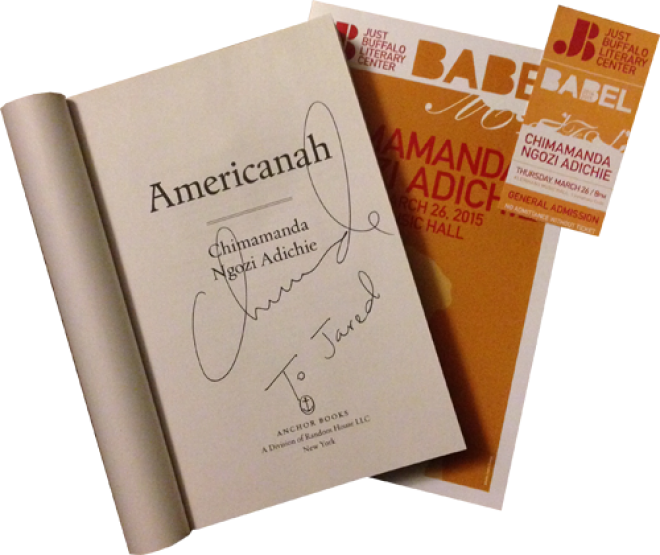The change was gradual, but 2014-2015 really cements it for Just Buffalo Literary Center‘s Babel series. What began as a venue for renowned writers to read their works and engage the audience in a conversation about story genesis and process has become somewhat of a publicity tour. Is this a natural evolution? Perhaps this year’s lecturers’ star power and familiarity with Hollywood and PR is to blame? Whatever the case, the Buffalonians who come love it. There are more people than ever attending and the applause given while the guests are still talking is the loudest I’ve heard in the eight years since its inception. I’m therefore not saying the change is bad. It’s simply different. But I also wonder if some of the earlier academic magic has disappeared.
Chimamanda Ngozi Adichie epitomized this movement with a talk centering on the house she grew up in at 305 Margaret Cartwright Avenue in Nsukka, Nigeria. A couple books made their way into the tale by way of milestones such as her parents buying her first desk so she’d have it upon returning from America after publishing her first novel Purple Hibiscus and how she knew she had to be in Africa to write her second, Half of a Yellow Sun. But it was all anecdotes. Yes it was intriguing to learn how her idol—Chinua Achebe—lived in that house before her family due to its location on a university campus. Yes she had important things to say about Americans’ ignorance towards the world beyond their borders. They were still mostly fun tidbits, though.
The main message outside of these details was that she writes because of/despite it all. To her the laziest question a journalist can ask is, “Where do you get your inspiration?” Adichie embraces the dynamic between magic and craft in her work—allowing the words to flow while making sure their placement on the page is structured to perfection. When people tell her that she writes with a socio-political allegory behind every novel, she sighs in acquiescence, remembering how little about Africa and most other countries Americans know and how that lack of education makes it seem like she harbors a hidden agenda. She doesn’t. She writes about human interactions and people who live their lives, characters taking themselves where they need to go whether she wants them to arrive at that place or not.
This doesn’t mean she ignores the reality of how her work is seen stateside—she actually finds discomfort in her own mind second-guessing decisions because they may reinforce stereotypes—but that’s not the place she consciously starts from when writing. Fiction and storytelling matters in a way that only art can and she accepts art and politics are forever linked despite it being a fashionable concept to believe they can be divorced from each other. Observing the world inspires Adichie, something that’s only truly possible when the significance politics plays on it remains intact. She relays how human stories are rooted in political consciousness and she is spot-on in that observation. Just because she writes about people in Nigeria doesn’t mean we, as Americans, cannot see ourselves in them. Human condition is paramount.
I wish she had elaborated on these aspects rather than injecting them in passing as she spoke about that childhood home. There were a lot of captivating details told with genuine humor and love that I’d have enjoyed hearing about as they concerned her as a writer rather than comic relief deflection. Things like her youthful desire to experience eating a bagel—this exotic food she read about in novels—only to find it was “a dense doughnut”. Or how she combats writer’s block by reading (poetry mostly, especially Derek Walcott), wandering the house, eating chocolate, watching YouTube, and online shopping. Or how it wasn’t until reading Achebe’sThings Fall Apart at eight years old that she realized books could have characters like her who weren’t white or from London.
To hear these seminal moments in passing did them a disservice in my mind. This is where the idea of a publicity tour crept in because it seemed so planned and colorful rather than stream of consciousness insight from deep within. This disappointment is all my own and Adichie does admit how she censors herself whenever talking personal details, stating that her memoir would be so redacted and false there would be no point writing one. If anything I should be happy to have been able to glean these small yet important pieces to her history sprinkled throughout that of her home. When you have Barbara Cole introducing her to flowery speech and talk about famous TEDTalks dealing with feminism, however, the expectation for more passion can’t help being conjured.
We saw a little of that fire in the Q&A session and it was brilliant:
• Someone asked Adichie her opinion on feminism in Africa and America as two separate entities and she called “bullshit”. She acknowledged the ways in which oppression occurs is different, but the injustice is the same. She doesn’t want western women belittling their own situation in comparison to international conditions because the problem is universal.
• Her answer for what Americans need was perfection. 1) More curiosity about the world. 2) Humility in power. 3) Cheaper healthy food.
• Her spin on “what white people can do to help the plight of minorities” proved the most profound. “Just listen and don’t ‘help’.” There’s nothing worse than a condescending liberal viewpoint held to be some kind of savior. Just listen and understand because equality is possible if you’re willing to not hold yourself as above others.
Babel 2014/2015 Season continues with:
Patti Smith (United States) – April 17, 2015 – Just Kids
Buy your tickets today by clicking here.

